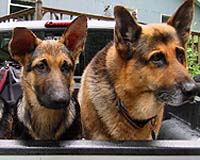| . |  |
. |
Geneva (AFP) Aug 6, 2009 The World Health Organisation moved to reassure the public about the safety of pandemic flu vaccines on Thursday, emphasising that rigorous precautions were taken despite the speed of their development. "The public needs to be reassured that regulatory procedures in place for the licensing of pandemic vaccines, including procedures for expediting regulatory approval, are rigorous and do not compromise safety or quality controls," said the UN health agency on its website. Although many national regulators had fast-tracked procedures for approval, the swine flu vaccine was built on the same technology used to produce vaccines for frequently changing strains of seasonal influenza, it said. The streamlined process was established in the WHO's 2007 pandemic preparedness plan, agreed by health experts, regulators and vaccine makers to ensure that a flu vaccine for a pandemic strain was available quickly and in large quantities. "During the 1957 and 1968 pandemics, vaccines arrived too late to be used as an effective mitigation tool during the more severe phases of the pandemics," the WHO said. Influenza vaccines were not available in the deadliest flu pandemic on record in 1918, when Spanish flu killed an estimated 50 million people. The WHO advised all countries to carry on intensive testing and monitoring of vaccines even after they start to be administered. While some serious adverse effects had been reported over the 60 years that flu vaccines have been used "these have been rare", it said. Nonetheless, the WHO said "special safety issues will inevitably arise during a pandemic" because of the massive scale on which a vaccine would be administered. "For example, adverse events too rare to show up even in a large clinical trial may become apparent when very large numbers of people receive a pandemic vaccine," the WHO added. Countries have been ordering tens of millions of doses of vaccine for the A(H1N1) virus for mass vaccination campaigns, while clinical trials are usually carried out on thousands of volunteers. The trials have began in Australia, Britain, China, Germany and the United States, WHO's director of vaccine research Marie-Paule Kieny said. "We expect more clinical trials to start in the days to come," she said, adding that first results of the trials should be collected in September. Regulators will then have to approve the vaccine before it would be made available to the public. If regulators were to approve the vaccine "in September, then it is possible that some countries (will) start vaccinating in September," said Kieny. She said that manufacturers have reported that vaccine virus strains are currently generating "disappointing" yields. Yields are now just between a third or half of what is usually obtained in a seasonal strain, meaning that this could result in a reduction in production capacity of the vaccine. A recent batch of vaccine viruses produced appears to contain a strain which seems to be getting equivalent yields as the seasonal vaccine, said Kieny. "I don't want to say too early that the question has been resolved but it really means that we have found a way to go around the problem," she said. Share This Article With Planet Earth
Related Links Epidemics on Earth - Bird Flu, HIV/AIDS, Ebola
 Dog Suspected Source Of China Plague; Quarantine Lifted
Dog Suspected Source Of China Plague; Quarantine LiftedBeijing (AFP) Aug 6, 2009 A dog is suspected to be the origin of an outbreak of pneumonic plague in northwest China that has killed three people and left 10,000 under strict quarantine, state media reported. Ziketan, a remote town in a Tibetan area of Qinghai province, has been locked down since Saturday in an effort to contain the spread of the highly virulent disease. One patient was in critical condition and e ... read more |
|
| The content herein, unless otherwise known to be public domain, are Copyright 1995-2009 - SpaceDaily. AFP and UPI Wire Stories are copyright Agence France-Presse and United Press International. ESA Portal Reports are copyright European Space Agency. All NASA sourced material is public domain. Additional copyrights may apply in whole or part to other bona fide parties. Advertising does not imply endorsement,agreement or approval of any opinions, statements or information provided by SpaceDaily on any Web page published or hosted by SpaceDaily. Privacy Statement |